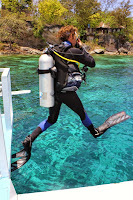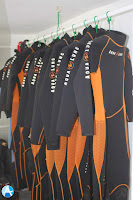Ever since the beginning of time, mankind has been known to dive the depths of the sea. There are records that go as far back as Ancient Greece. A certain Greek warrior made history by managing to ingeniously escape his Persian captors. He dove in the water, breathed through a hollow reed and while submerged, he was able to cut the enemy ships loose and made his way to freedom.
The Greek philosopher Aristotle also recorded in his manuscripts the diving contraption that the forces of Alexander the Great used to clear the harbor at Tyre in 332 B.C. This contraption was actually a wooden barrel shaped like a bell, hence it was called a diving bell, which was worn over the head and covered the upper body and allowed the diver to walk, breathe and see clearly underwater.
Aside from recorded historical events, ever since the dawn of time, the earliest peoples and tribes to have walked the earth primarily started diving in the water to forage for food, sponges, shells and to search for pearls. Pearl Diving still exists and is still practiced at certain locations where the divers pretty much dive for pearls the way their ancestors did.
As the years passed and technology improved, diving has seen some great developments. From the invention of the first scuba diving apparatus by Benoit Rouquayrol and Auguste Denayrouze until today, where scuba divers enjoy the latest advancements in equipment, training and certification. By the way, SCUBA is actually an acronym for “self-contained underwater breathing apparatus” and was developed by Christian J. Lambertsen in World War II for the purpose of underwater warfare.
I hope you enjoyed my quick history lesson there. I just wanted to give you a brief background of how diving and scuba diving came about. Like almost everything else in this life, it seems to me that the earliest forms diving came about for a certain human need, to name a few: food, survival and to win wars. Necessity, they say, is the mother of invention. The earliest divers, like the Greek warrior I mentioned above, probably didn’t think of any safety measures, dive plans, procedures, etc. He simply took a chance and dove in the water to escape the Persians. Although I love the topic of Ancient Greece, unfortunately, we are already in the modern times. Advancements in diving and scuba diving specifically have increased a hundredfold. There is really no reason for us to take off our clothes, dive in the water and not think of any precautions or safety measures.
This is where the importance of scuba diving certification comes in.
You know, I had a conversation I had with a friend of mine a couple of weeks ago. Lucky for him, he has a close family member who happens to be a dive master and actually owns a dive house in Dauin, Negros Oriental. Scuba divers from all over the world come to my friend’s uncle for training, certification and a little R and R. That’s why I can’t imagine why he dives without any certification at all! He says it costs too much and anyway, his uncle taught him the basics. He probably has gone diving in Cebu a few times with his diver buddies that just allow him to tag along with them. I can’t stress out enough how unsafe this is. I quickly asked him about the most basic safety measures and emergency procedures when scuba diving, he gave me general answers and said, “It’s just fun anyway, I have no plans to it professionally.” Well, I simply thought to myself, this isn’t Ancient Greece, anymore, buddy. This post is for you, if you’re reading this. Here’s a few pointers on how important scuba diving certification is. Don’t worry, I’m not going to give you a history lesson anymore, these are just the 3 simple reasons why you need to get certified before you scuba dive:
Safety
Humans live on land. We breathe Oxygen. Above ground is where we live. Those three statements should tell you that once we are in the water, we are simply guests. The world underneath our waters are alien and sometimes even, hostile environments. Sure, it is also beautiful and the experience is unlike any other. Once, while scuba diving in Cebu, specifically in Malapascua, I swam alongside a Hawksbill Turtle and I was choking back tears. It was truly magical, an experience I will never forget. However, let’s get back to the point, since we are guests in an unknown environment, isn’t it but logical to learn from the hazards of the earliest divers, take advantage of the available training and certification which we now have and learn how to dive safely? Yes!
Scuba diving certification allows you to learn from a professional dive instructor who will ensure that you will get the proper training. They will teach you the basics of how to handle and how your scuba diving equipment works and various safety procedures in a classroom environment. You will then apply all you have a learned in a pool and again, they will take you in a real open environment to ensure that you have absorbed everything you have learned.
Sure, it is costly. It can set you back hundreds of dollars. However it is necessary and trust me, knowing that you are safe and that you know what to do at times of emergencies will make you enjoy diving more. One way to save money on certifications is to get it online. Check out your preferred diving agency’s website for information on online certifications.
Renting Gear
Let’s be practical here. I am in Cebu. And once, we went to Thailand on a dive trip with my family. Sure I can load up all my equipment when I go diving in Cebu however if I can’t transport all my gear all the way to another country! It’s too heavy and yes, expensive. So this is another primary reason why getting certified is very important: if you plan to dive in other parts of the world, renting gear will be tough if you don’t have a scuba diving certification as most, if not ALL, dive shops around the world would require you to present your scuba diving certification, to ensure your safety and to know that you know how to handle the gear that you are renting.
More Options for Diving
Divers without certification can still dive. But they will enjoy very limited dive options and won’t have the chance to go on more challenging dives. Divers with no certification can go on group dives, that’s still possible but you won’t be able to explore the deeper, more beautiful parts of the dive spots as you can only go on beginning dives with the instructor. In short, certified divers are divers who can enjoy diving more as you can have the freedom to dive almost everywhere, alone, with a buddy or within a group.
So, with that brief history lesson and 3 important reasons why you should get certified, don’t you think it’s about time that you sign up for a beginner level scuba diving certification? I hope so. That way, you can explore the beauty of scuba diving even more.








The Importance of Getting A Scuba Diving Certification